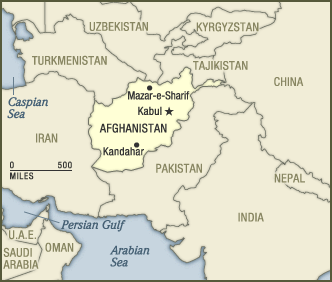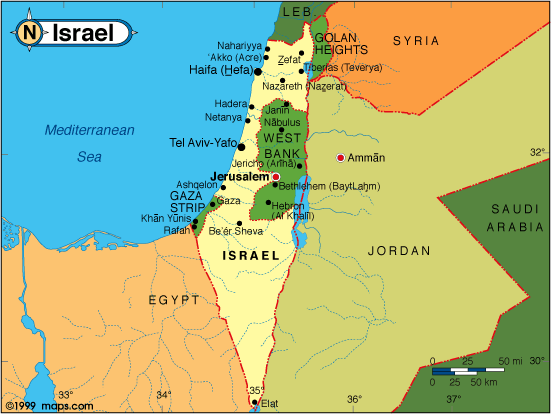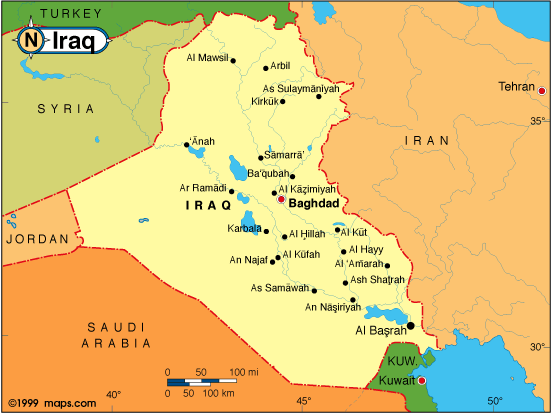BACKGROUND
- The War & Peace category encompasses situations around the world
where the US is involved in a prolonged military intervention,
or where the US is involved in prolonged peace negotiations.
Currently, that includes four regions of the world:
- Central Asia: the War on Terrorism, focusing on Afghanistan.
- The Balkans: history of Kosovo, Bosnia, and other former Yugoslav republics.
- Israel & Palestine: history since 1948 through the current peace process.
- Persian Gulf: situation regarding Kuwait, Iraq, Iran, and the Gulf War.
Other foreign affairs are covered in other pages of this web site: - Foreign Policy: Other world hotspots, as well as strategy and principles of foreign affairs.
- China: Specifics regarding China & Taiwan, including human rights & trade issues.
- Homeland_Security: Defense spending, weapons planning, and other military issues.
The War on Terrorism

- On Sept. 11, 2001, terrorists hijacked four commercial jets from Boston and Washington, and flew them into the World Trade Center in NYC and the Pentagon outside DC, destroying the Twin Towers and killing over 6,000 people. It was the worst terrorist incident in history.
- Pres. Bush appointed Tom Ridge as the "terrorism czar," formally creating a cabinet-level post for a new Office of Homeland Security, initially funding it with $40 billion.
- NATO invoked Article 5 of its charter, which commits 18 European allies to military action in response to an attack on the homeland of the US.
- The primary suspect is Osama bin Laden, an exiled Saudi millionaire based in Afghanistan.
- The CIA formerly funded bin Laden as a leader of the mujaheddin, or freedom fighters, when the Soviet Union occupied Afghanistan through the 1980s.
- Bin Laden turned against the US when troops were stationed in Saudi Arabia during the Gulf War in 1990. He issued a fatwa, or religious edict, calling for the removal of US troops from the Holy Lands of Mecca and Medina.
- Bin Laden's organization, al Qaeda, which means "The Base," funds terrorist training and operations, and has been implicated in past terrorist actions in the 1993 World Trade Center bombing, the 2000 USS Cole bombing, and the 1998 simultaneous attack on two US embassies in Kenya and Tanzania.
- The US responded to the embassy bombings by a cruise-missile attack aimed at bin Laden, terrorist training camps in Afghanistan, and chemical factories in Sudan. The US also by indicting bin Laden in US criminal court.
- The Taliban is the Muslim fundamentalist political party which rules most of Afghanistan. They were the largest army of the mujaheddin, and were also funded by the CIA in the 1980s. Their leader is Mullah Mohammad Omar.
- The Taliban rules under Shari'ah, or Islamic law as described in the Koran, which implies strict interpretation of moral codes and numerous personal restrictions.
- A portion of Afghanistan is ruled by the Northern Alliance, another mujaheddin group. Their leader was assassinated in the week preceding the World Trade Center attack; it is unknown whether there was a connection.
- The exiled king of Afghanistan, Muhammad Zahir Shah, has agreed to participate in a coalition government if the Taliban is overthrown. King Zahir is 86 years old, and has resided in Rome since 1973.
- Afghanistan's neighbors are:
- Pakistan (which shares the Afghan ethnicity of Pashtun in its northern provinces);
- Iran (which shares the Northern Alliance's religion of Shi'a Islam);
- Tajikistan (a former Soviet republic, which also has a Shi'a minority);
- Turkmenistan and Uzbekistan (two other former Soviet republics; they are majority Sunni Muslim, like the Taliban);
- and China (bordering its Muslim province, known as Xinjiang in Chinese and Uighurstan in Arabic, where there are regular Islamic uprisings).
- The Taliban is recognized only by Pakistan; Saudi Arabia and Yemen, the only other countries to have recognized the Taliban, severed diplomatic ties in late September.
- Pakistan supplied the mujaheddin before and after the Soviet occupation. Complicating relations with the US, Pakistan exploded a nuclear device in 1998, in response to India's doing so. India and Pakistan have been fighting a sporadic war for decades over the Kashmir region.
History of Yugoslavia
Yugoslavia was created after WWI, from a federation of Balkan countries. The intention was avoiding further Balkan wars like those which ignited WWI. After WWII, its borders were redrawn with six republics plus two provinces within Serbia. (click on the map below left for an enlarged view).
Sovereignty
The six Yugoslav republics (see below) have all had history as independent nations. The two provinces within Serbia (Kosovo and Vojvodina) were never independent, with legal status like California within the US. Hence much of the debate on Kosovo centers on 'sovereignty' -- attacking Kosovo can be viewed as an attack on the sovereignty of Serbia while it was involved in a Civil War. Bosnia, on the other hand, had autonomous legal status like Puerto Rico within the US. Bosnia had declared independence from Serbia before the US sent troops there, and hence sovereignty was not an issue.Marshal Tito
Marshal Tito was the Communist leader of Yugoslavia since WWII. He is credited with holding the Yugoslav republics together (by dictatorial force), and after he died in 1980 the republics began to clamor for more autonomy. Further pressure for independence came from the fall of the Soviet empire in 1989.Breakup of Yugoslavia
In 1990, a new Yugoslav Constitution was enacted. Four republics soon declared independence, leaving 'Rump Yugoslavia' as only Serbia plus Montenegro.- Status of the former Yugoslav republics and provinces:
- Slovenia: Declared independence in June 1991; one-week war with Serbia (a 'bloodless' war because Serbia focused on Croatia); Slovenia is now a prospering nation with hopes of joining NATO.
- Croatia: Declared independence in June 1991; longer war with Serbia; heavily involved with Bosnia war.
- Macedonia: Declared independence in Nov. 1991; avoided war because of arrival of international forces (including US forces, which are still based there). Greece has blocked full international recognition because the name 'Macedonia' is also the name of a Greek province.
- Bosnia-Herzegovina: Declared independence in 1992; lengthy war with Serbia and Croatia, with all three countries involved in 'ethnic cleansing.' The war ended with the Dayton Peace Accords in 1995. US forces are still stationed in Bosnia, which is partitioned into three ethnic regions (Serb, Bosnian, & Croat).
- Montenegro: Still part of Yugoslavia as an autonomous Republic. Montenegrins are ethnically identical to Serbs; they differ only by geography. But in the wake of the Kosovo war, Montenegro may declare independence.
- Serbia: Legally, Serbia is just one republic of Yugoslavia. But the Serbs have always been the dominant group in all of Yugoslavia since is formation.
- Kosovo: Remains a province within the republic of Serbia. Its population is 3/4 Albanian (referred to as 'ethnic Albanians' to differentiate from residents of the neighboring country of Albania).
- Vojvodina: Also remains a province within the republic of Serbia. Its population is 1/2 Hungarian (they border Hungary, and prior to WWII were part of that country).
Slobodan Milosevic
- Milosevic came to power as Chairman of the Communist Party in 1986.
- His popularity increased greatly in 1987 after a speech in Kosovo strongly advocating Serbian nationalism (the speech was made on the site of a 14th century battlefield. This is the political basis for Milosevic not granting Kosovo independence).
- Milosevic was democratically elected President of Serbia in 1989, and elected as President of Yugoslavia in 1997.
- He was indicted as a war criminal in June 1999, the first time a sitting President has been indicted. His alleged crimes include genocide and ethnic cleansing.
- In October 2000, Milosevic lost the presidential election to Vlajislav Kostunica. Milosevic gave up power after widespread protests and Russian urging.
- In April 2001, Milosevic surrendered to Serbian government forces. He faces extradition to an international tribunal as well as domestic charges.
Religion and Ethnicity
- The major religious divisions in Yugoslavia explain much of the political divisions:
- Eastern Orthodoxy is the religion of the Serbs, Macedonians, and Montenegrins. Hence Russia (who are also Eastern Orthodox and ethnically Slavic) support the Serbs, and Greece (who consider Macedonians ethnically Greek) identifies with Macedonia.
- Roman Catholicism is the religion of the Croats, Slovenes, and Hungarians. Hence Croatia and Slovenia are religiously distinct from Serbia even though they are all ethnically Slavic.
- Islam is the religion of the Bosnians and the Albanians (including those in Kosovo). Hence the country of Bosnia-Herzegovina is all ethnically Slavic but has three distinct religious groups.
Kosovo
In 1999, the US and NATO negotiated with Milosevic in Rambouillet, France, attempting to resolve the Kosovo crisis without ethnic cleansing or war. The goal was to be a 'Rambouillet Agreement' fashioned after the Dayton Agreement that ended the war in Bosnia. The peace talks failed, and NATO bombed Serbia and Kosovo from March to June 1999. Milosevic capitulated; the Serbian Army left Kosovo; and NATO, Russian, and UN troops are now stationed there under the 'KFOR' banner.- 1948: The UN partitioned British Palestine into a Jewish state (Israel) and an Arab state (Palestine). Six Arab countries declared war on Israel; Israel survived with borders different than those drawn by the UN; these are now known as the "pre-1967 borders." Palestine did not survive; the East Bank and West Bank of the Jordan River were taken over by Jordan, and the Gaza Strip was taken over by Egypt. Many Palestinians became refugees in the 1948 war; they have still not been resettled and are the subject of the current debate on "right of return."
- 1956: Britain, France, & Israel invaded Egypt to force open the Suez Canal; they briefly occupied the Sinai Desert until pressured by the US and UN to withdraw.
- 1967: Israel won the "Six Day War" and occupied Gaza & Sinai (from Egypt); the West Bank (from Jordan); and the Golan Heights (from Syria). Jerusalem, split in 1948 between Israel & Palestine (and then Jordan), was unified under Israel; they annexed the whole city in 1980.
- 1973: A bloody war ended with no changed borders, but established the groundwork for an Egyptian-Israeli peace treaty in 1979. Egypt's president, Anwar Sadat, shared with Israel's Menachem Begin the Nobel Peace Prize in 1980 for his efforts, but paid for it with his life in an assassination in 1981. As part of the Egyptian peace treaty, Israel withdrew from Sinai (but not Gaza). The shaky peace has held up since, with regular US intervention and billions of dollars of annual US aid to both Egypt and Israel.
- 1982: Israel invaded Lebanon in response to terrorist attackes by the Palestinian Liberation Organization (PLO). Israel surrounded the Lebanese capital, Beirut, forcing the PLO and its chairman, Yaserr Arafat, to withdraw. Israel began its withdrawl from Lebanon in 1985; Syria still occupies parts of the country. Israel also began establishing settlements on the West Bank in the late 1970s, which are a major point of contention in today's peace negotiations.
- 1987: Palestinians in Gaza and the West Bank began an uprising against Israel, called "the Intifadeh." The PLO's Arafat signed a peace treaty with Israel in 1993, granting Palestine eventual self-rule in Gaza and the West Bank -- this is the peace treaty which is still being phased in today. Jordan also signed a peace treaty with Israel, in 1994.
- 1996: Arafat is elected president of the "Palestinian Authority", and renounces the PLO Charter's clause calling for the destruction of Israel. In 1998, the Wye River Accords (under Pres. Clinton) negotiated further Israeli withdrawal from the West Bank. In 2000, a "Second Intifadeh" began in the West Bank; it continues today.
Israel & Palestine

Persian Gulf
- The Iraq War formally ended on Dec. 15, 2011. Approximately 5,000 "security contractors" will remain to guard the US Embassy in Baghdad, plus several thousand more "general support contractors." Another 9,000 US troops are just over the border in Kuwait.
IRAQ HISTORY:
- Throughout most of the 1980s, Iran and Iraq fought a bloody war. It ended with no border changes, and without any US intervention.
- In 1990, Saddam Hussein invaded Kuwait, claiming it as a province of Iraq. The US and numerous allied assembled by Pres. George H. W. Bush built up a counterforce in Saudi Arabia and succeeded in 1991 in pushing Saddam's army out of Kuwait.
- On the 10th anniversary of the Gulf War, President-elect George W Bush declared Iraqi leader Saddam Hussein "a big threat" and said he must be contained - by military force if necessary.
- In Jan 2001, outgoing President Clinton signed and transmitted to Congress a report on the provision of assistance to the Iraqi opposition. The report outlines plans for the transfer of humanitarian assistance for the relief of the Iraqi people and for radio and television broadcasting by the Iraqi National Congress (INC). The report also identifies certain issues that must be resolved in relation to implementation of those plans.
- The primary purpose of the provision is to assist those Iraqis who have been displaced from their homes or who are not receiving adequate assistance from the UN and other assistance organizations.
- Kuwaiti society is still deeply conservative. A strong Islamic current runs through the country-Islamists are fairly well represented in parliament and there is the odd Islamic extremist attack, against video stores or women not wearing the veil.

| | Close | |